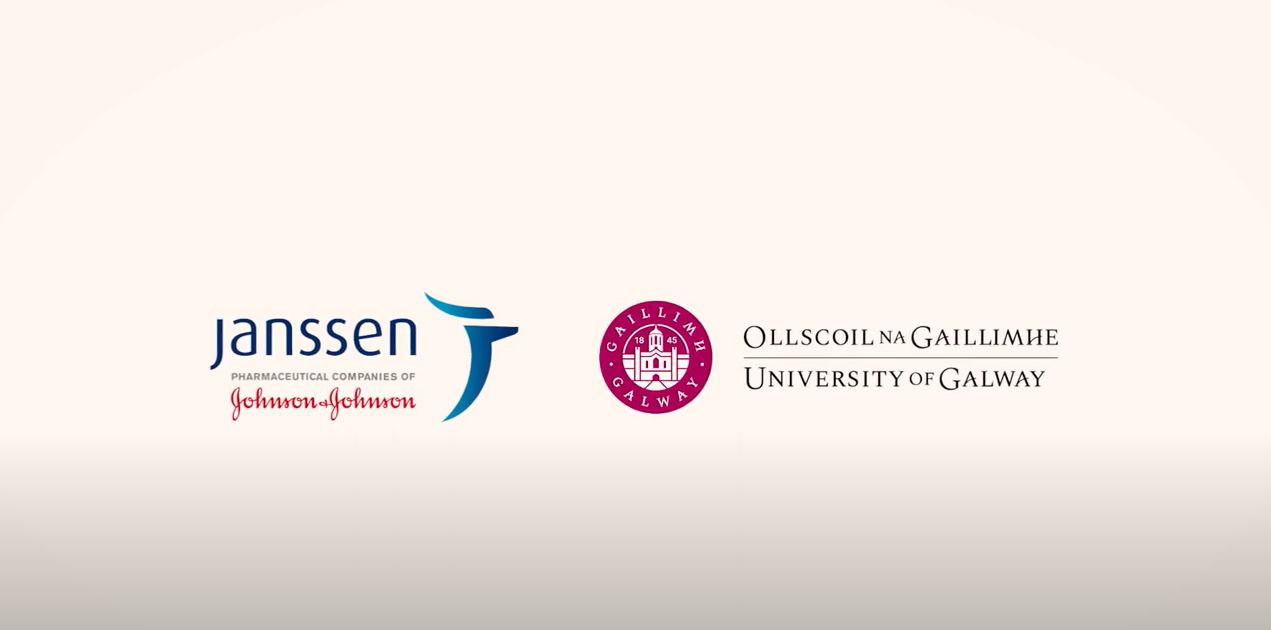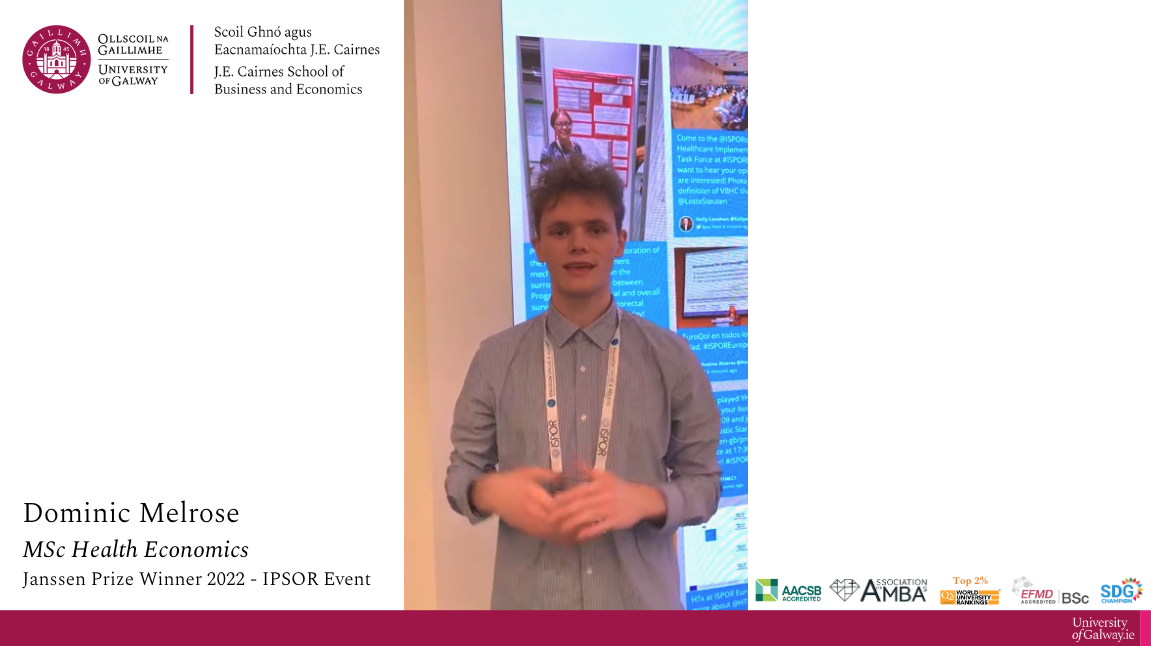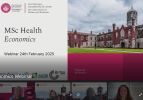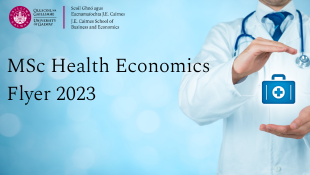-
Courses

Courses
Choosing a course is one of the most important decisions you'll ever make! View our courses and see what our students and lecturers have to say about the courses you are interested in at the links below.
-
University Life

University Life
Each year more than 4,000 choose University of Galway as their University of choice. Find out what life at University of Galway is all about here.
-
About University of Galway

About University of Galway
Since 1845, University of Galway has been sharing the highest quality teaching and research with Ireland and the world. Find out what makes our University so special – from our distinguished history to the latest news and campus developments.
-
Colleges & Schools

Colleges & Schools
University of Galway has earned international recognition as a research-led university with a commitment to top quality teaching across a range of key areas of expertise.
-
Research & Innovation

Research & Innovation
University of Galway’s vibrant research community take on some of the most pressing challenges of our times.
-
Business & Industry

Guiding Breakthrough Research at University of Galway
We explore and facilitate commercial opportunities for the research community at University of Galway, as well as facilitating industry partnership.
-
Alumni & Friends

Alumni & Friends
There are 128,000 University of Galway alumni worldwide. Stay connected to your alumni community! Join our social networks and update your details online.
-
Community Engagement

Community Engagement
At University of Galway, we believe that the best learning takes place when you apply what you learn in a real world context. That's why many of our courses include work placements or community projects.
Health Economics (MSc)
Course Overview
The MSc in Health Economics provides students with a strong foundation in economic theory and its application to health policy and healthcare decision-making. The programme addresses key global challenges, including technological advancements, an ageing population, rising healthcare costs, and evolving patient expectations.
Programme Focus
Students will develop expertise in:
- Analysing individual health behaviours and healthcare choices.
- Evaluating healthcare financing and delivery systems.
- Applying economic evaluation, preference elicitation, and econometric techniques to optimise resource allocation.
Structure & Learning Approach
The programme combines lectures, workshops, tutorials, and seminars led by academics and industry experts. Students complete either a minor dissertation or an applied placement project, typically undertaken during a summer placement with a relevant organisation.
Career Opportunities
Graduates pursue careers in:
- Pharmaceutical and consulting firms (health economics & market access).
- Public sector roles in government, health services, regulatory bodies, and public health agencies.
- Research and academia, with many progressing to PhD studies.
Key Learning Outcomes
Graduates will be able to:
- Understand and apply core principles of health economics.
- Analyse global health policy and industry challenges using economic evaluation, health preference elicitation, and econometric techniques.
- Engage critically with healthcare financing, service delivery, and access to medical technologies.
Programme Events & Highlights
Students attend the Johnson & Johnson offices as part of the WiSTEM mentoring programme:
Student Paul Coady receiving the Johnson & Johnson bursary award:
Students hear from Dr Padraic Ward of the Novartis Global Real World Evidence team:.png)
Students attend the IPHA conference in Dublin:
Applications and Selections
Applications are made online via the University of Galway Postgraduate Applications System.
Who Teaches this Course
Requirements and Assessment
The programme is assessed in a variety of ways, including coursework, examinations, and a dissertation or an applied placement project completed over the summer months.
Modules are assessed through a combination of written examinations, continuous assessment, assignments, and applied projects. Semester One examinations take place in December and Semester Two examinations take place in April/May. In line with employer needs, communication and presentations skills are implemented in the assessment structure.
Students must complete either a dissertation or an applied placement project. The programme director and the host organization will determine which is the most appropriate assessment for each student on a case-by-case basis.
Key Facts
Entry Requirements
Normally a H2.1 degree (NFQ Level 8 or equivalent) with Economics. However, candidates with a significantly high H2.2 honours degree and who have achieved a 2.1 average in relevant Economics modules in a business degree, will also be considered. Applications for the full-time and part-time programmes are particularly welcomed from people working in the pharmaceutical or medical device sectors and from people working in the health policy or health care system sectors. Suitable applicants without a background in Economics will be offered an opportunity to take an online preparatory course before being accepted on the programme. IELTS score of 6.5 or equivalent, if applicable.
Academic entry requirements standardised per country here.
English language requirements here.
Additional Requirements
Recognition of Prior Learning (RPL)
Duration
1 year, full-time; 2 years, part-time
Next start date
September 2025
A Level Grades ()
Average intake
20 full-time, 10 part-time
QQI/FET FETAC Entry Routes
Closing Date
Offers will be made on a rolling basis.
NFQ level
Mode of study
ECTS weighting
Award
CAO
Course code
MSC-HEC
Course Outline
Course outline (full-time programme)
The MSc in Health Economics consists of 90 ECTS (European Credit Transfer and Accumulation System). Students complete a combination of modules (worth 10 ECTS) and a dissertation or applied placement project (10 ECTS) to fulfil the 90 ECTs requirement.
Semester 1
Core
- Economics of Health and Health Care
- Economic Evaluation in Health Care
- Econometrics
- Research Methods for Health Economics and Policy
Semester 2
Core
- Health Systems and Policy Analysis
- Applied Health Technology Assessment and Decision Modelling
Optional
- Market Access and Health technology Assessment
- Public Sector Economics
- Cost Benefit Analysis and Evaluation
- Applied Econometrics
- Observational & Analytical Research Methods
- Introduction to Systematic Reviews
Summer
- Dissertation or Applied Placement Project
Dissertation
Students must complete either a dissertation or an applied placement project. The programme director and the host organisation will determine which is the most appropriate assessment for each student on a case-by-case basis.
Course outline (part-time Programme)
The MSc in Health Economics consists of 90 ECTS (European Credit Transfer and Accumulation System). Students complete a combination of modules (worth 10 ECTS) and a dissertation or applied placement project (10 ECTS) to fulfil the 90 ECTs requirement.
Year 1
Semester 1
Core
- Economic Evaluation of Health Care
- Research Methods for Health Economics and Policy
Semester 2
Core
- Applied Health Technology Assessment and Decision Modelling
Optional
- Market Access and Health technology Assessment
- Public Sector Economics
- Cost Benefit Analysis and Evaluation
- Applied Econometrics
- Observational & Analytical Research Methods
- Introduction to Systematic Reviews
Year 2
Semester 1
Core
- Economics of Health and Health Care
- Econometrics
Semester 2
Core
- Health Systems and Policy Analysis
Optional
- Public Sector Economics
- Cost Benefit Analysis and Evaluation
- Applied Econometrics
- Observational & Analytical Research Methods
- Introduction to Systematic Reviews
Summer
- Dissertation or
- Applied Placement Project: Work placements are competitive and subject to the availability of suitable positions. We will source as many work placement opportunities as possible, but it is at the discretion of employers as to whether they shortlist and offer a position to applicants. Students may also self-source their own work placement subject to the approval of the Placement Office.
Why Choose This Course?
Career Opportunities
It's an exciting time for Health Economics as health economic analysis and decision-making become ever more important in the global context of technological development, population ageing, rising healthcare costs and changing patient preferences and expectations. This MSc programme provides a comprehensive understanding of the theoretical, analytical and policy-making aspects of Health Economics, with a particular focus on Health Economic Evaluation (Health Technology Assessment).
Key features of the programme include:
- Practical Experience: A significant component of the programme involves student placements with leading companies and institutions in the Health Economics sector.
- Strong Employment Prospects: Graduates of this programme have demonstrated high success rates in securing relevant positions within the field.
- Flexible Learning: The MSc is offered on a full-time (one year) or part-time (two years) basis. Most lectures are delivered in a hybrid format, accommodating students with work commitments.
- Industry Engagement: Students benefit from employer talks, mentorship programmes (such as WiSTEM), and opportunities to attend professional conferences.
- Recognition of Excellence: Student achievements are recognized through a bursary prize for best student performance, sponsored by Johnson & Johnson Innovative Medicine Ireland
Who is suited to this course?
The course is suited to individuals from multiple backgrounds who are interested in pursuing a new career in Health Economics or in incorporating the tools of Health Economics into their current career pathway. The course will suit recent graduates in Economics, Business, and the Social Sciences who have studied Economics. The course is also open to recent graduates in Mathematics, Statistics, Engineering, Medicine, Pharmacy and the Health Sciences who have completed a bridging course in Economics. The course will also suit individuals working in the Pharmaceutical or Medical Device industry sectors or in the Health Policy or Health Care sectors who wish to advance their careers by gaining a thorough understanding of the theories and methods of Health Economics.
Health Economics and Policy Analysis Centre (HEPAC)
The aim of the Health Economics and Policy Analysis Centre (HEPAC) is to develop, apply and teach methods for the economic analysis of health and health care. The Health Economics and Policy Analysis Centre (HEPAC) is located in the Institute for the Lifecourse and Society (ILAS) at University of Galway. The Centre is part of the research network at the J.E. Cairnes School of Business and Economics, which includes the Whitaker Institute for Innovation and Societal Change. HEPAC have extensive links with clinical and social science researchers at University of Galway, as well as being engaged in active collaborations with colleagues in national and international organisations. Researchers at HEPAC are currently applying health economic methods to explore a range of research questions in relation to ageing, dementia, disability, mental health, chronic disease, cancer, and obesity. While the research is mainly of an applied nature with an emphasis on peer-reviewed academic output, members of HEPAC also engage and contribute to policy formulation in a range of areas at national and international level. Current research projects include those funded by agencies such as the Health Research Board, Science Foundation Ireland, Atlantic Philanthropies, and industry partners. Click here for more information.
Who’s Suited to This Course
Learning Outcomes
Transferable Skills Employers Value
Work Placement
Each student completes a 8-12-week placement with a company, a government agency or a health research agency. Placements have previously been organized in major pharmaceutical and medical device companies, in agencies such as the Health Service Executive, the Health Information and Quality Authority, and the National Centre for Pharmacoeconomics and with leading research centres at University of Galway and beyond.
We have a dedicated Placement Officer to support the sourcing of internship opportunities, and guide students through the work placement process. Students are encouraged to arrive at University of Galway for the start of their Masters programme with a current graduate CV. During workshops and one-to-one meetings, our Placement Officer guides students in improving their CV and in preparing for interviews.
The placement Officer conducts interactive CV and Interview Skills workshops with students, alternating an explanation of theory and examples of best practise with practical exercises. For more information about the internships, please contact our Placement Officer Ms. Valeria Lopez at valeria.lopez@universityofgalway.ie
We also have a close relationship with the University of Galway Career Development Centre who provide high quality career guidance and information services focused on facilitating and empowering our students to manage their own career development and make effective career transitions.
Services include: Jobs Fairs, Seminars and panel discussions, Employer Presentations / Activities, Workshops and support with applications and work-related skills. Visit our Career Development Centre for more information.
Study Abroad
Related Student Organisations
Course Fees
Fees: EU
Fees: Tuition
Fees: Student levy
Fees: Non EU
For 25/26 entrants, where the course duration is greater than 1 year, there is an inflationary increase approved of 3.4% per annum for continuing years fees.
Postgraduate students in receipt of a SUSI grant – please note an F4 grant is where SUSI will pay €4,000 towards your tuition (2025/26). You will be liable for the remainder of the total fee. A P1 grant is where SUSI will pay tuition up to a maximum of €6,270. SUSI will not cover the student levy of €140.
Note to non-EU students: learn about the 24-month Stayback Visa here.
Find out More
Programme Director: Dr Ronan Mahon
E: ronan.mahon@universityofgalway.ie
E: economics@universityofgalway.ie
Quick Links
- Accommodation Office
- International Students
- Postgraduate Funding—Scholarships
- Student Support and Resources
What Our Students Say

Dan Kelleher | Research Assistant in HEPAC pursuing a PhD
The MSc. in Health Economics is a fantastic qualification to have and it provides the necessary skills in becoming a Health Economist. Students receive theoretical and practical experience in areas such as, Health Systems & Policy Analysis to developing cost effectiveness models that are used in health technology assessments (HTAs). The course provides students with great opportunities to attend conferences and seminars, which are a fantastic opportunity to network and learn from experts in the field. The Health Economics and Policy Analysis Centre (HEPAC) at NUIG is the largest single group of academics working within the area of Health Economics on the island of Ireland, creating the perfect environment for students to learn. The MSc. has allowed me to work for one of the biggest medical device companies, a management consultancy firm and to my current role as a Research Assistant in HEPAC pursuing a PhD.

Ashlie Elnoursi | Health Economist at HCD Economics Ltd - HCD Economics Ltd
The campus is a beautiful friendly environment with excellent facilities. Coming from a BA in public and social policy the Masters programme in health economics was quite intensive, however the lecturers were extremely helpful and approachable. Our class was very cooperative and friendly. What drew me to NUI Galway was the potential placement opportunity the course offers. I conducted my placement with the Irish Haemophilia Society which opened up many doors for me. Not only did I gain real work experience relative to my field I was brought along to conferences and this enabled me to network. This is where I met my current employer. I now work for health economics consultancy firm in the UK. Health economics is an extremely useful course to have completed which can be applicable to a work force internationally. This was a huge factor in my decision in picking this particular course. I had a great year doing my MSc and would definitely recommend NUI Galway if you are considering this course!

Liam McMorrow | Curently studying for his PhD in Health Economics in the UK
I found the MSc in Health Economics to be an intensive, well organized programme that provided me with the knowledge and confidence to pursue a PhD and a career in academia. The course modules taught us how to approach and answer problems in health economics and how to apply skills that were directly applicable to the workplace. I used many of the skills we learned in my master’s thesis and am now in the process of using the knowledge and techniques I learned at NUI Galway in my PhD.

Sinéad Mahon | Country Manager with BresMed Health Solutions
After studying economics as an undergraduate at NUI Galway I decided to focus on health economics as a career choice. As well as further developing core economics competencies, we covered the full spectrum of health economics fundamentals including Health Systems & Policy, Health Technology Assessment, and Decision Modelling. The class sizes were small, and the lecturers could provide a strong level of support. Making the transition into the private sector did not prove difficult as NUI Galway is well recognised across the industry as one of the leading centres for health economics in Ireland
What Employers Say

Gilles Ducorroy Patient Access Services Head | Novartis Global Service Center
I am delighted with our on-going partnership with the Cairnes School of Business and Economics at University og Galway. Currently, 50% of our team of health economists studied in University of Galway as part of their MSc or PhD. Health economics and outcomes research is a growing field for Novartis globally that provides important information for making healthcare coverage and access decisions. We support this work from Dublin through the services provided via our Novartis Global Shared Services Center.”in Connect with Gilles Ducorroy




















